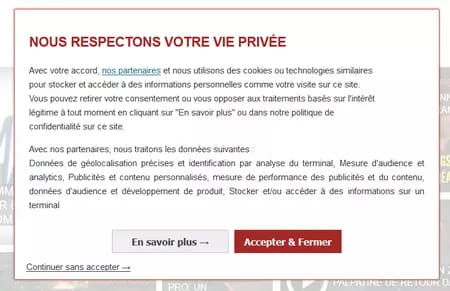Qwant, the French privacy-friendly search engine, has just launched VIPrivacy, a free web browser extension capable of automatically blocking trackers and advertising cookies.
Since its creation, Qwant has staked everything on respect for privacy. Recommended by the State and major public institutions, the French search engine thus claims not to track its users and not to sell the data resulting from their requests, while presenting neutral results, unlike American giants like Google or Bing. whose economic model is based precisely on the exploitation of this information. And to go even further in the protection of Internet users, Qwant now offers VIPrivacy – Very Important Privacy –, a web browser extension that automatically blocks trackers and advertising cookies. A free tool that guarantees users of the engine a navigation without tracking or advertising.
VIPrivacy: automatic blocking of cookies
In practice, Qwant VIPrivacy takes the form of an additional module for Chrome, Edge and Firefox. Once installed in the browser, it sets Qwant as the default search engine – which obviously doesn’t preclude using Google or DuckDuckGo, for example! – and, above all, automatically blocks tracking cookies, which follow the Internet user from page to page during his navigation. Even better, on most sites, VIPrivacy bypasses the annoying display of the message requiring a choice for cookies. You don’t even have to snoop around to find the refusal or settings link: the page you are looking for is displayed directly, without asking anything. A real relief which significantly smooths the navigation, and which avoids falling into certain tense traps. The extension has a few settings accessible in a small control panel – via a click on its icon – allowing you to refine its behavior by defining a level of protection (Standard, Strict or Disabled).
In fact, Qwant is attacking what is called the privacy paradox, when users agree to share their personal data when they really don’t want to. This paradoxical behavior is often the result of techniques combining psychology and ergonomics, such as the famous dark patterns, which encourage Internet users to perform certain actions to go faster or benefit from advantages, in particular accepting all cookies to immediately access a site. . VIPrivacy blocks advertising tracking tools and tracking beacons by automatically refusing cookies and suppressing the display of most intrusive banners on many websites.
Qwant: the engine without a tracker
With VIPrivacy, Qwant reaffirms its desire to respect the confidentiality of its users’ travels. The engine, which has just reviewed its interface and its graphic charter to clearly differentiate itself from the courrence, has even found a funny slogan: “Qwant doesn’t know anything about you, and that changes everything!” A whole program that will be broken down into an awareness campaign around the issues of privacy on the Internet. Will this be enough to make Qwant more popular. Not sure. Admittedly, the search engine has progressed and evolved a lot since its launch in 2013. And it recorded more than 200 million queries per month in 2021, an increase of 15% compared to 2020. But it nevertheless remains very far behind. Google which satisfied some 6.9 billion queries per day the same year! And if it does not plan to compete with the American giant, Qwant promises to continue to improve by developing “new privacy and personal data protection solutions […] beyond the search engine” and focusing on its search results in France and Europe as well as on its Qwant Maps and Qwant Kids services. In the meantime, VIPrivacy is proving to be a tool as original as it is effective, which should be tested.



